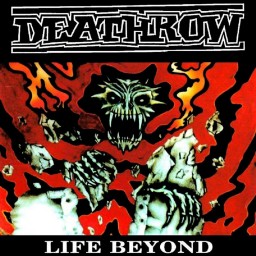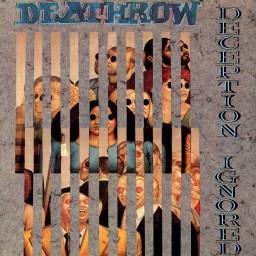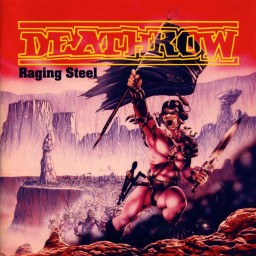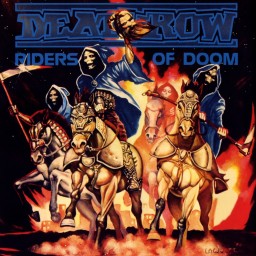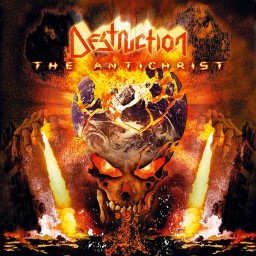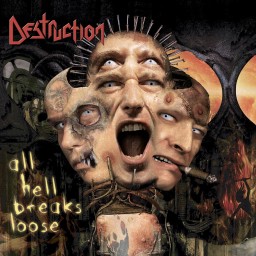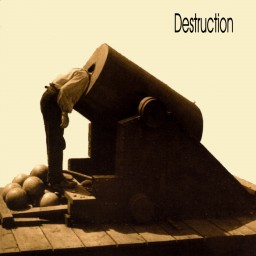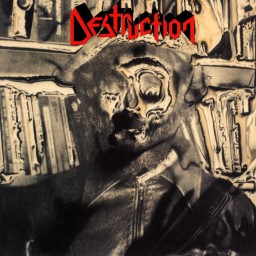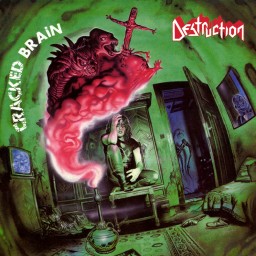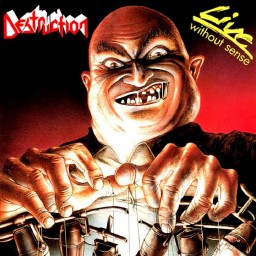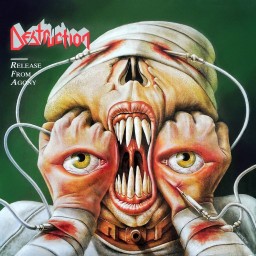Latest Reviews
Since the turn of the century Kreator have taken to releasing a new album every four or five years and here we are at the beginning of 2026, with the world turning to shit, and the Teutonic Titans delivering full-length number 16. With Mille and Ventor both turning 60 this year, it would be overly optimistic to expect that they will ever reproduce the bile and venom that they unleashed with their classic period which spanned from "Pleasure to Kill" to "Coma of Souls". Indeed, they haven't really issued anything essential since 2005's "Enemy of God". This does not, however, mean that a new Kreator album deserves to be ignored. No, far from it because, although "Krushers of the World" is inconsistent and patchy, occasionally a brief glimpse of former brilliance does shine through.
There are riffs a-plenty and there is a decent energy to the album, but on the whole this latest is a little too groove-laden for my particular taste with choruses that often seem to have been written with optimum catchiness in mind and, as such, it lacks the biting venom of the band's best work. Some of the best moments come from the guitar solos which are deployed more sparingly than I would like, but when they are used, such as during "Barbarian and "Combatants"," they elevate the tracks with a level of intensity that the riffs and vocals don't quite encapsulate. For my money, the clear highlight of the album is "Psychotic Imperator". It sounds the closest to classic-era Kreator with an added choral section and a searing guitar solo that elevate it to head and shoulders above the rest of the album.
I guess that "Krushers of the World" delivers pretty much what you would expect from a Kreator album at this stage of their career, being cast into shadow by the monumental magnificence of their best and trying a little too hard to capture listeners with sometimes overtly catchy choruses. I am sure there are many who couldn't wait to tear this apart and I have no wish to join them as nothing here is actually poor but, apart from the aforementioned "Psychotic Imperator" I can't hear too much that will keep me returning to this either.
I have a real soft spot for the often-ridiculous fantasy artwork of heavy metal albums from the eighties. Asgard’s one and only album release from 1986 has enough levels of grandiosity on its artwork to make up for a whole career of albums that never where made. A muscular warrior, barely clothed in a loin cloth stands, bow drawn back ready to take down another mountain crocodile that is somehow completely out of its natural habitat and is attacking him and his cleavage proud princess fawns at his feet. Yeah, the eighties weren’t the best for gender equality, were they? That is not to knock the quality of the artwork by any means. Personally, I think it looks fantastic, and I was sad to read of the passing of the artist responsible for this amazing piece, Ken Kelly in 2022. He is of course better known for his excellent work on Manowar covers as well as The Gates of Slumber and even Satanic Warmaster. If this was a review of the album artwork, then it would be a solid four out of five-star rating.
Sadly, despite their best efforts, Asgard’s musical prowess doesn’t quite match the exploits of the cover artist. In short, In the Ancient Days is all over the place. As with most speed metal albums, there is a fine line being walked between traditional heavy metal and speed metal. In the Ancient Days tends to follow this same pattern accordingly. A mixture of Venom sneer creeps into the vocals of Rene Tholen, teetering on the brink of the over-theatrical on tracks such as ‘Witches Brew’ and ‘Hounds of Hell’ (the version on YouTube has either a skip from a vinyl rip or there’s a terrible edit job on the actual record just before the twenty-minute mark). Yet at the same time, the riffs on this record are superb examples of the heyday of thrash/speed metal. Remembering that this record is now forty-years old, there is a heavy element of nostalgia in my feature selection this month in The Pit.
Being more at the extreme end of metal in terms of my listening habits, the more thrashy/speed metal elements are where I find highlights on In the Ancient Days. The drama could easily be left at the door for me, along with the acoustic (flamenco?) guitar of the interlude ‘Granadinas’ which is crudely placed as the penultimate track on the record. Whether this should be considered as some intro to the anthemic sounding album closer ‘Metal Tonight’ I am unsure but the combination of these two tracks at the end of the album does leave a sour taste in my mouth to finish the album on. I am unaware as to why Asgard lasted for only one album. The ability was there on the debut, albeit not terribly well showcased overall and I sense if the talent could have been grown over subsequent albums then we might have heard the name Asgard more over the years.
Italian speed metallers Bulldozer have never featured very highly in my listening within the realms of The Pit clan. Whilst I would not put their limited airplay down to any problem they present to me, at the same time, I cannot pretend to have ever been overwhelmingly entertained by any of the stuff I have listened to from them. The Final Separation doesn’t put a foot wrong as such, yet nor does it tread anywhere particularly new or even influential either. At times reminiscent of Venom (‘The Cave’) whilst on other occasion being just as close to Motörhead, the album lacks any of the rhythmic riffs that would steer it in the direction of thrash metal and as a result I would suggest the thrash metal tag is irrelevant for this album.
If you a connoisseur of eighties speed metal, then The Final Separation probably holds more sway for you than it does with me after over three decades of listening to metal; I left this sound behind a long while ago I feel. Whilst I am not alien to humour in my metal music, tracks like ‘Don Andras’ are just juvenile to my ears these days. Serving only to break up the otherwise very similar tempos of tracks to this point, this song has little value and stinks of filler.
With, ‘Never Relax’ at least offering some hope of variety for the second half of the album, I could have been forgiven for thinking I was being a little too harsh on the first few tracks. It is cumbersome though and feels pieced together as opposed to a free-flowing track. ‘Don’t Trust the Saint’ is the nearest to thrash metal we get to on the album, but it bounces more than it chops and my interest soon wanes. Final track ‘The Death of Gods’ grumbles some promise of an epic closure to the album, however this is soon lost in an overly grandiose soundscape that pushes my interest onto other things in the room.
OK, so I'm sure there will be a few people who will question my having awarded the universally-panned eighth full-length from Swedish black/Viking metal godfathers Bathory a decent score & I would have sat in that camp when I first heard it at the time of release too but it's honestly nowhere near as bad as people make it out to be. Sure, the production has intentionally been kept as raw as fuck & Quorthon's vocals aren't gonna win any awards but surely we were all used to his vocal deficiencies by that stage & the song-writing isn't half bad most of the time, if never threatening to deviate from the classic underground thrash metal sound.
Quorthon said at the time that Bathory had backed themselves into a creative corner after 1991's "Twilight of the Gods" by releasing ever more epic albums so he was looking for the next step in terms of style. He ended up releasing a grunge solo album in 1994 so as to tick off a bucket-list goal he'd always had & it felt great to be able to simply create something he'd wanted to for a long time without worrying about what his fan base thought. Some of his fans had been telling him that they missed his older, rawer Bathory material so he decided to make a raw, DIY-style thrash record for fun with 1994's "Requiem" being the result. He enjoyed the process so much that he followed it up with "Octagon" around six months later & both were brutally criticized by fans & critics. I agree that "Requiem" was subpar but "Octagon" is a little better in my opinion, if being noticeably simple in its construction. Sure, there are a few duds to be found here (see "Century", "War Supply" & "Judgement of Posterity") but there are also some very solid inclusions like "Sociopath" & "Schizianity" & the wins comfortably outweigh the losses. I even quite like the fairly faithful rendition of KISS's "Deuce" so I guess it's fair to say that "Octagon" is a guilty pleasure for me these days. It's strange how time can sometimes change your perceptions so much, isn't it? I can do without the sections that look to tackle the classic Anthrax sound though as they fail dismally.
For fans of Kreator, Slayer & Celtic Frost.
Having fully differentiated themselves from blackened thrash acts of the past while improving on the strengths of their own debut as well as the strengths of the albums that influenced them, Destroyer 666 continued to prove themselves with another album that took the metal world by an apocalyptic storm. The improved blackened production adds yet another layer of depth to an already pretty deep band. You can hardly find any black or thrash metal that sounds this harsh. I Am the War God will tell you everything you need to know about how far their blackened production has gone. The first half might really impress you, and the second half is even better. The extra ferocity in the production and riffs goes hand in hand with the more creative solos.
But I do have this to say. In their efforts to cement themselves as great artists, there were a couple things they forgot. For example: The Last Revelation is only 2.5 minutes long when it could've had so much more potential on its own, what with how easy these guys make complex and weird guitar solos look. Just look at the title track. That one needs a few people to lasso it in. I guess they really wanted to make sure the title track specifically stood out, and they did. As well, the diversity factor was a little bit weakened to make room for the new sound. Otherwise, this album is five kinds of insane.
90
If there's one thing I want to see in an album, it's a strong sense of art. On their debut album, Destroyer 666 seemed to utilize that a lot more than a lot of other thrash bands did with their debuts. After having finished a Metal Academy Thrash Albums Challenge, comparing them to Unchain the Wolves was pretty easy. The band is really trying to exceed their artistic limits here. Slow-paced melodies and tempos like the ones present on Genesis to Genocide and Tyranny are so carefully handled for their long runtimes due to a strong sense of epic atmospheres. And then you have rocket-speed hitters like Australian and Anti-Christ which makes a point of emulating the blackened thrash sound of early Bathory but with the band's own presence, and then moments that can go pure black and assault your ears and brain like Six Curses from a Spiritual Wasteland. Now the melodies aren't always the best, but they're operable and they're varied enough in each song to ensure than nothing gets tiring. Even a shorter song can go to three different places before it reaches the halfway point and still feel like its own song. However, with the sharing of standard thrash and black tempos, there's also an are of familiarity present through the album. These are most present in Side B, and they get a little tiring by that time. Otherwise, the album is pretty well done. These guys seem to have an authantic hatred for organized religion, and that anger drives both their creative side and the ferocious mood of the album.
87
I've been very busy with metal today. And I am two albums away from completing my third List Challenge on Metal Academy: it all ends with Razor's Violent Restitution. Now the first two Razor albums (heard them both with a replay of The Years of Decay in between) were good thrash exercises with properly noisy production, but neither one was able to impress me on the technical side other than featuring the band being self-aware enough not to go into overdone six-to-eight-minute territory. So they were pretty good, but that's about it. This album's different. The three-minute intro makes a point of going the extra mile in aggression while giving us some much weirder solos and more unpredictability by going even faster than ever. When they pull the buzzsaw out, it might as well be replacing the guitarists and you'd barely notice. That kind of revelation gave me a similar feeling as Todd Rundgren's motorcycle-style guitar solo in Bat Out of Hell. That same song, named Taste the Floor, boasts a number of wild decisions and twists in its two-minute runtime. That's the album these guys made. Of course, since many of these songs are between 2 and 3 minutes, it's safe to assume that many of these songs have the same basic goal: be a buzzsaw, a hyperactive and indomitable exercise in the thrash energy and production that defined them. Rarely does the album take any time to slow down, with the best example being Edge of the Razor, the longest track on the album (4 minutes 15 seconds). But a dozen songs of the same formula can still get tiring, so by the end, it becomes obvious that this album should never even have been 40 minutes.
So this is easily the most fun Razor album out of the three I've heard, and like many other thrash albums, the reason for its status as an essential is because it manages to be so freakin' heavily and pull it off. But there's not a lot of originality among the excitement and riffs, so that's enough to knock off a full star from a perfect rating for me.
80
Overkill's always been a fun band before anything else, and back when I was first exploring the thrash scene many years ago as a total noob to metal, these guys were one of the major players. But I rarely return to their albums now because of so many other ventures and the fear that I was neglecting other genres for metal, just like when I neglected too many other movie genres for horror. So now that I'm back on metal for the time being, this is the perfect time to go over this.
Now once again, these guys are fun, a lot of fun. Because they focus so much on songwriting and twists and turns each song, it's easy to see why this album became a staple for the band and the thrash fans. The production is their clearest so far. They've earned it after an impressive catalogue beforehand. Of course, it started out with a couple of little problems, despite being a lot of fun. First of all, the album's all about shifting places, but song of these songs are sharing some of the same ideas and twists. It doesn't help that they share the same tempo as well. Nothing super-surprising happens until the guitar solo to Nothing to Die for. As well, despite perfectly clear production, this also makes the album feel a little empty in the background, like the album's missing another layer that should never have been neglected or removed. This also allows for some songs to become overlong. I mean, 56 minutes can easily be too much in a genre where one of the four leading icon albums of said scene is literally half that length. And I'm talking about Reign in Blood, with the others being Ride the Lightning, Master of Puppets and Rust in Peace (forget Anthrax for me, will ya?)
But the album has a good deal of creativity and shows much more effort in this vein than with previous works, even if I may call those previous works better for doing a much more impressive job with the elements they had than this album does. The Sabbathian rhythm to Playing With Spiders was totally unexpected but very much apprciated. Hell, the singer's iconic voice is just PERFECT for this. He's basically a thrash variant to Bon Scott, but a better singer overall, so pairing this with doom metal was a good move. On top of which, how often do we even get thrash bands that venture into doom metal? Can we just take a moment appreciate the fact that an iconic thrash band with an already good set of albums decided to take this turn and pull it off?
...
...
Thank you for enjoying that moment with me.
This might not be their most well-fleshed out album, but it's good to see that they were trying out some new tricks. Overkill rarely ever does a bad album because they always have spirit and the willingness to branch out behind them, and ironically, The Years of Decay seems to be the perfect album to fully describe their personality.
88
You'd think a leading influence in the world of crossover thrash would've lasted longere than 2 studio albums, especially considering how popular the combination of hardcore punk and thrash metal got in the thrash scene. Slayer and Voivod were both rocking the influence, even if they rarely ever reached the blatancy of S.O.D. Now this album is made up of nearly 20 similar songs, all going for the same basic goal: combine the two genres and complain about the things punk rockers complain about. This leaves little room for guitar solos and is mostly built for the explosion of quick songs built to cater to the youth growing tired of modern politics and authority. But there are a number of strengths that need to be considered here. First of all, for a thrash debut, the production is practically FLAWLESS. No demo-style noise which is extremely common for thrash debuts, not studio saturation of any kind. It's pure, simple punk, through and through. As well, these guys are excellent at the one thing they do: thrash punk traditions as hard as they can. And the lyrics might be to the point, but they embody the multiple facets of the punk spirit perfectly, even when they're going into the comedy of it all. This isn't a perfect album in terms of the art, but it's a perfectly punk album, so it's essential both punk and thrash.
86
With the band having expanded their sound into more artistic territory on their second album, Dreamweaver, further emphasis on that was placed on their third, which was ironically the last thing they ever produced. Now there seems to be a kind of alienation that the fans felt, which would explain a collective of negative reviews on the internet. This alienation likely stems from the further forays into standard heavy metal, ballads and prog metal. As well, there's a new vocalist with a stronger melodic voice rather than the raspy thrash voice everyone who knows the band is familiar with. Personally, I don't think this is much of a problem. This new singer seems to fit the more dramatic side of the music that the band was going for. On top of that, the majority of this music is actually pretty good, sometimes flat out banging. These guys really pushed themselves in the creativity department, but never once make the album feel inconsistent or messy. But be prepared for a very different kind of album, this more melodic, focused and versatile album just doesn't sound like the original Sabbat at all. Having said that, they pushed that specific sound as far as it could go without breaking new territory, so an album like this was gonna happen eventually.
73
Afte having seen some pretty positive reviews for English ban Sabbat's debut album, I was quite disappointed with how monotone and one-track-minded it got overtime. I was wondering if the fans were largely just attributed to genre fans as opposed to more explorative music buffs. Now I may be a thrash fan, but I demand ART. There's a noteworthy amount of that in this album, at least in comparison to the debut. The Clerical Conspiracy, the track following the intro, boasts an almost blackened level of heaviness and production in the riffs. Next even comes a soft folk track which lasts two minutes. This is what I'm talking about when I want an album to be less monotone. There's a little more creativity in the lyrics as well, on top of some prog metal aspects, which help justify this album's two eight-minute tracks, making them feel shorter than they really were, which in itself is a major strength since the band couldn't even justify the one eight-minute epic on their debut. However, while the album is certainly wilder, most of it still sounds the same, though much more impressively so. In fact, I couldn't even consider the last song before the one-minute outro, Mythistory, a proper send-off, because it sounded too much like other tracks, proggy aspects and all. So this is obviously a good effort with some great moments, but while it's more creative, it carries a couple of the same basic flaws as the first.
81
After checking out English thrash band Sabbat's two early demos, I went straight into the debut. I expected a fun but standard-sounding thrash band, as was the norm of the time, and for the most part. But I honestly have to say that I'm not terribly impressed with this overall. The writing quality, production quality and the overall atmosphere are a little better than the usual thrash debut album I came across for the thrash challenge on Metal Academy. Destruction was generic and underproduced for several albums, for example. This has PROPER production. Not perfect, but proper and largely clear with only a faint hint of noise factor. The album's overall vibe and essence is fun fodder for the thrash junkie. The technicality isn't that extreme, and largely done before, but it showcases all the skills that the demos showed off but were unfortunately tarnished by demo quality audio, and almost completely drowned by the first. The eight-minute epic, Horned Is the Hunter, pretty much drags through standard thrash behavior without any sense of branching out. Eventually it got so samey, monotone and standard that I was losing interest. I finished it, though. Overall, this debut is decent but passable.
67
One can't deny that there's a punk factor in thrash, as much as some purist metalheads might want to. Voivod, however, celebrated that fact by pumping it up. In some ways this is practically a crossover thrash album, and a major step forward for metal inventiveness. Maybe this is largely neglected because the album is so complex? Either way, this is the personality the band has chosen, and it actually helps a lot. Now their technical abilities are quite impressive, but it's the inclusion of the punk factor that keeps the album from degenerating into guitar wankery. While a little samey, the crossover aspects allow the band to display an incredibly unique personality for the time, and just allows the band to have a lot of fun. Hell, the singer Denis Belanger knows it, and boasts his hardcore punk style vocals proudly and loudly. And that's not all: they found a way to include the sci-fi experience here, the whole mechanical, cyberpunk, anti-dystopia vibes both lyrically and musically. As well, the punk factor gives it quite a bit of replay value as well. Now personally, I'd say the sameyness keeps this from a total five stars. But if you said this was your favorite thrash album, I most certainly would never, ever, blame you.
92
In comparison to KAT's debut album Metal and Hell, as well as their very slightly better live album 38 Minutes of Life, there are a number of notable improvements. While we still get some general bursts of tropes, such as the entire midsection of dziewczyna w cierniowej koronie, we see a number of more intriguing compositional chocies, such as the first and third acts of that same song. Tempos range out more, allowing the band to try to be artists. The band will even jump to some wonderfully weird, abrupt and unexpected surprises that never break the vibes. It also helps a lot that the voice of the singer, Roman Kostrzewski, has improved in a number of ways. He has a good high-pitched growl, a decent low growl and a decent actual singing voice. The practice he must've gone through, it's actually a bit inspiring. As well, the production is no longer the quality of a better demo or a cheap live album. This is totally clear on every level. BUt there is ONE downside to the stlyistic changes: the black metal aspects are severely neglected. Thnakfully, the album manages to keep a strong artistic flow, so I'm still quite satisfied with the direction they took.
91.5
There really isn't much I wanna say about this debut album except that it's pretty basic. Everything about this debut album is a product of its time. The production and melodic quality sound a bit like this one hair metal band that went nowhere: Nitro, which my stepfather told me about, considering them one of the worst bands ever. This album might have some genre appeal for metalheads because the sound is so nostalgic, but it's too easy to compare this fuzzy 150 BPM-central thrash album to so many better albums of its type. I would even go as far as to say those two crappy Nitro albums have a couple better guitar solos in them. Our singer isn't that great, either. He sounds like a bad, noisy knockoff of the singer from Metal Church. They pull off some decent tricks throughout the album, but overall this early speed metal release is too generic for my tastes. In fact, it can be so generic that I was even getting tired of it about halfway through.
Well, I'm one demo and two albums in, and it's becoming quite apparent that Sadus is one of those bands that has to write the same album in order to stay noticed. And if I'm wrong, you certainly wouldn't know it from this sophomore effort, because Swallowed in Black sounds EXACTLY THE SAME as their debut, Illusions. Well, that's mostly true. I'm not sure, but something about the bass feels toned down, like it's slightly adjusted but managed to trigger no real effect. Because it sounds exactly the same, you may be pleased that the riffage and the heaviness are still on point. This is in fact, Sadus. But that can only justify so much. To me, rewriting the same album with very few new techniques is just being lazy. It's basically saying, "look at what we can STILL do because we're afraid to try anything new." And the few little things that are new, like the intro to Good Rid'nz, are typically so quickly disposed of that it actually kind of feels insulting. Thankfully, this doesn't always happen, with the midtro of Images being a good example of incorporating a somewhat slower tempo and a more intriguing yet monotone composition in the mix. But once again, it still finds its way back to the same generic thrashing. The album doesn't have a single song that shows the band focusing on a new direction until the six minute Arise which is the 10th out of 11 songs! As a result, I am much less excited by the riffs and whatnot that were done so well on the first album. They're fun for the thrash fan in the long run, but they feel mostly like empty shells, especially since the album's longer. That which I called "face-melting" when reviewing the debut seems less so. I know this is a thrash classic, is loved by thrash fans and is even bolded on Rateyourmusic, but I'm gonna be "bold" for a minute and say: I got more out of Kenny G's Duotones.
Even though Holy Terror remains an obscure band throughout most musical and even metal-based communities, the thrashers go crazy over their second and final album, and with excellent reason. There are a few noteworthy changes between the debut and the sophomore. First: the production is better. I find that a bit interesting, considering the lo-fi nature of the previous album's production aged well. However, it's not QUITE perfect, so it loses the acidic charm of lo-fi metal. Second: the album is much faster. The energy of the previous album was easily a saving grace considering that the songwriting didn't stand out, so this excess in energy helps this second piece to reach Kreator levels of energy. Thirdly, the songwriting is a bit more unpredictable, surprising and sometimes progressive or a little neoclassical. It seems that the group went through a major stylistic re-evaluation in order to make this album, and it worked out beautifully. The Immortal Wasteland has a more cinematic and storytelling presence to it than anything that came before, a bit like a power metal song or something by Manilla Road. In fact, that one song alone can symbolize how far they came since their enjoyable yet generic debut, but we get a three-part song immediately afterwards, almost a la Pink Floyd. The title track is an absolute pace-changer than challenges out idea of proper songwriting while boasting about the jam-packed nature of the intro while the last 2.5 minutes of manage an actual song that has some amazing riffs, but needs the vocalist's singing to raise the volume a bit. As well, it finally achieves a little sameyness by the end, which is unfortunate considering how surprising the album was.
So other than these three little gripes, this album would be flawless. This is one of the most fun, jamming and heavy thrash albums of the 80's, and I'll definitely check it out a second time.
97
Yet another classic built on speed and aggression, once again there's not much in the stylistic department that separates this album from many classic thrashers of that day and age. With their debut album, Sadus makes a point of raw, untamable, face-melting riffs that walked right out of the radioactive waste bucket. Some of the songs from their Death to Posers demo make it onto this album with clearer production, which has little-to-no reverb and no noise in the background, being crystal clear without shoving effects in your face. Major riffage and vulture shrieking, end all be all. Now how does the composition stack up against the others? The album is extraordinarily fast-paced, even for thrash, so the band is able to switch tempos like a possessed pocket knife releasing and sheathing its many tools. But because many of these songs are between 1:40 and 3:00, this often comes at the expense of the songs feeling fully structured, like it's just plain missing verses that somehow got left out by accident. In other words, this album is a raw exercise in metal energy rather than writing, so it manages to be quite a bit of fun for the thrash band and has aspects that are superbly well put together, but still manages to feel incomplete.
82
Holy Terror is a thrash band that largely goes unnoticed by the metal community because there are so many more classic bands in the scene, especially bands who did more than two albums. Those in the know may consider the band a thrash essential. With the debut that started a short-lived career, they already showed that they have some idea of what to do right. As is the case with most thrash albums of the time, the production is lo-fi in the vein of Ride the Lightning, which both helps and hinders, and aggression is almost purely the name of the game. There's an undeniable level of skill involved in the speed. These two elements have a sense of purity about them that makes it a perfect product of the time. Unfortunately, it also falls into the "generic" category as many bands of the time were trying to attempt these same basic thrash song structures, so the edge of this album can largely be attributed to... the edge. Most of these songs are basic yet energetic thrashers with an almost perfect noise and reverb factor. The first attempt at a slower balled happens five songs in, but because it's basically a two-parter, we go back to the typical stuff halfway through the song. So, while it's one of the thrashiest thrash metals you can find, it's also quite typically written and offers more energy than surprises.
77
Fourteen albums in and still Chuck Billy sounds like an absolute fucking monster. In terms of positives to take from Para bellum, it is a tossup which to take as the standout section, Billy’s vocals or Peterson and Skolnick’s guitar work. The riffs on here are certainly on a par with the quality exhibited on Titans of Creation, an album that I only recently revisited, awarding a four-star rating to it in fact. For the first three tracks on the new record at least, Testament pick up where they left off on their previous album from five years ago. That level of intensity of delivery from a band who are four decades into their existence is no mean feat it should be acknowledged. There is a vitality to Testament that left the likes of Megadeth many records ago. It sounds like Testament are not simply enduring the latter years of their career, more that they are enjoying them.
That is not to say that Para bellum is a flawless record, in fact it is far from that in my experience. When I first played it, I was bitterly disappointed, to the point where I was possibly not going to bother revisiting. My recent exploration of Titans… had left the bar high and the initial run through of this album did not get anywhere near for my money. A more critical listen (in my usual protected place of in bed with headphones on) did pay dividends though and I am now of a much more positive mindset of than I was. I must agree with what Sonny calls out in his review though, Para bellum does suffer with filler and as a result ends up outstaying its welcome. I too can forgive the power ballad, ‘Meant to Be’ even though it is placed far too early in the track listing for my liking and is quite disruptive as a result. The fact that the ‘High Noon’, the first of the filler tracks comes in after it makes this random cowboy track stick out even more.
There is in fact no memorability across the middle section of the album. The track listing appears to disappear into a black hole in fact for three tracks which is a particularly bad place for any album to run out of steam. The fact that it then falters again after ‘Room 117’ ensures that the band end up feeling like they just fall over the finish line as opposed to romp over it with the success that the record promises early on. I am not even convinced by the title track that closes the album. So, in the end, Testament show enough positives to avoid a score that reflects their latest album being a failure, yet they do lack the stamina to go the full length. Right now it sits just behind Sodom’s effort this year and ahead of the poor Destruction album that came out this past March.
It seems like the Old School are mounting a fightback in 2025 with new albums from Coroner, Sodom, Dark Angel, Destruction, Onslaught, Hirax, Sacrifice and Testament all hitting the shelves of metal emporiums the world over. I would be lying if I said I was feverish with anticipation over any of the above, but in the past all have made thrash albums I love to a greater or lesser degree, so at least deserve a hearing. Now, I do like Testament, Chuck Billy is one of my favourite thrash metal vocalists, but somehow, much like fellow Californians Exodus, outside of their debut album they just don't excite me as much as they should, their songwriting not always flipping my switches.
Initial impressions of Para Bellum, however, are good, especially as Chuck's excoriating bellow is still as potent as ever, despite being the same age as me, old bastard (me, not Chuck)! Kicking off in thrashtastically invigorating style, the opening dual salvo of "For the Love of Pain" and "Infanticide A.I." hit pretty hard with some high-energy riffing, scintillating leadwork from Eric Peterson and Alex Skolnick and defiant roars from Chuck. They follow this up with the medium-paced chug of "Shadow People", allowing for a change of pacing and lyrical content. Whereas the opening brace are lyrically centre around the modern concern that the power-hungry few are trying to exert control over the wider population's lives, "Shadow People" takes on the old metal staple of demonic forces and black magic.
"Meant To Be" kicks off in 80's power ballad style as Testament attempt their own version of "Fade To Black", with the track building in intensity and heaviness, although the stadium-friendly, Zippo-waving chorus is a bit cheesy-sounding for my taste, the lead work is pretty decent. Whilst it misses the mark a bit, I do applaud the band trying to mix things up and provida a little bit of the epic amongst the machine-gun firestorm around it, which certainly continues apace with the next couple of tracks, "High Noon" and "Witch Hunt", both of which attempt to tear your head from your shoulders with chainsaw riffs and by sheer weight of aggression. I think new drummer, ex-Seven Spires skinsman Chris Dovas is probably worth a mention at this point. Following previous two drumstool occupants Gene Hoglan and Dave Lombardo gives Dovas some pretty big boots to fill, but his drumming is precise and powerful and provides the riffs with added impetus and velocity.
Unfortunately this point now sees the album hit a flat spot as we hit filler territory. "Nature of the Beast" is the blandest and most uninspiring track on the album for my money and I feel its presence also has a negative effect on the next track "Room 117", which isn't strong enough to lift the album, despite a decent chugging riff and a nice mid-track solo, with it feeling like it too is dragged down by the banality of its predecessor. "Havana Syndrome" encounters more of the same, with the vicious main riff being let down by a rather unimpressive chorus. The album concludes with the title track and here we hear the band back at full tilt and sounding so much better as a result as they declare war on your eardrums once more with a war-drenched slab of epic thrash glory.
There is a killer 41 minute album in here. I would have liked them to have stripped out the two filler tracks, "Nature of the Beast" and "Havana Syndrome", which would have left us with a leaner, meaner fighting machine of an album. I also know that "Meant To Be" is a misfire, but like I said, I kind of admire the intent behind it, so am inclined to want it to remain. All-in-all I am glad to have heard Para Bellum and would have no issue picking up a copy if I could get it for under a tenner.
I think it was possibly Knife’s debut album from 2021 which would mark the last time a speed/thrash metal record showed enough vigour and intensity to make me stop and take notice. For all the talk of regurgitation of old ideas, themes, styles and genres in modern metal, it is the likes of Vulture who give me the assurance that, if done well enough, the old-school can be worshipped and not come off as simple plagiarism. Whereas their fellow countrymen in Knife deploy a blackened edge to proceedings, Vulture are all about the shrieking, banshee wailing style of speed metal that you would associate with the likes of Razor or Exciter. Perhaps bordering on the power metal elements of Agent Steel also along the way, these Dortmund residents certainly know how to wear their influences on their sleeves.
Above all else, Sentinels is fun. It’s 80’s horror flick style album cover perhaps denotes a band with serious intent and I am not intimating for one minute that Vulture are a goofy band, more that they approach their art with a genuine enthusiasm, a passion that bleeds into their music. Leads soar over galloping riffs, vocals pierce the ears of anyone within a mile radius, yelled from lungs that swell with pride as they sing each lyric, and all the while the drums “thunk” along in the background. Never coming across as having much in the way of venom or bite, the drums are the most understated instrument on the record, to my ears at least. However, this is not necessarily a criticism as I think the production job does the sound real justice overall. Clean without being overproduced, the album has an atmosphere of a band playing live almost.
This is not my first venture into Vulture. I gave their 2019 album, Ghastly Waves & Battered Graves a four-star rating back in August of that same year, and I find Sentinels to be in the same ballpark of the ratings, albeit that I sense a step up in quality of musicianship, certainly in the leads department at least. I am not a massive fan of the hi-pitched vocals that are used here, although my tolerance of them during my listen through of this record was surprisingly good. It is the fiery riffs and blinding leads that reign supreme over the record for me though. The inclusion of an instrumental at track seven seems a bit of an odd choice if I am honest, and I struggle to fight the feeling that it is little more than filler, despite its best efforts.
Leave me with tracks such as the rampant ‘Death Row’ and I am much happier though. In fact, the section of the album that follows ‘Der Tod trägt schwarzes Leder’ is probably the stronger part for me. There certainly feels like an uptick in the quality for me over this backend of the record at least. Keep flying the flag for the old school fellas, it is appreciated.
Sometimes albums just slip by you, don’t they? Whilst I would not class myself as an avid fan of Testament exactly, I do have a few of their albums and made a purchase of Formation of Damnation on vinyl in the last twelve months. Yet somehow Titans of Creation slipped by me unnoticed. I could say “more or less” unnoticed because now I have gone back to my catalogue Excel spreadsheet I can see that I rated this record at three out of five, which could suggest an average album, or (given that I never transferred that rating onto Metal Academy) more likely that it was a holding score until I could find time to give the record a critical listen. News today that a new album is in the offing, in a year that has little in the way of quality releases stacking up in The Pit clan, brought this album from five years ago back onto my radar.
The fact is, Titans of Creation is a great thrash metal record. I would go as far as to say Testament’s best since 2008’s Formation… album that I enjoyed so much I made a physical purchase of it. Following the mediocre Dark Roots of Earth and the flat sounding Brotherhood of the Snake, Titans… is a much more dynamic sounding record. Opening strongly with the racing ‘Children of the Next Level’ I immediately sensed that the band indeed had upped their game to the next level in a literal sense. The guitars and vocals especially sound like they have a burning hunger to them, the lead work is nothing short of exceptional at times which is something that has been missing for too long on Testament records. ‘Dreamer Deceiver’ is brilliant in this regard and it is a toss up between this track and ‘False Prophet’ for which is my standout moment on the record.
Inevitably almost, with twelve tracks in play, there are some blunted moments where the razor-sharp nature of what we have heard overall gets the edge taken off it. After a solid first half of the record, things do get a little patchy thereafter, but they never go into full on filler mode thankfully. Whilst it may not always translate into fluid thrashing music, the energy levels behind it rarely abate and that is so refreshing to hear from a band at this stage of their career. The outro to the record seems particularly pointless in the grand scheme of things but I still find it forgivable if a few less-than-ideal moments slip through due to clear overexuberance on the bands part. If they can carry this enthusiasm through into Para Bellum later this week then I personally be a very happy chappy.
This year, 2025 saw the return of two thrash/tech-thrash bands after over 3 decades without new material; Dark Angel and, you guessed it, Coroner! The progressive tech-thrash of this Swiss trio is still in full force after that huge gap, proven in their new album Dissonance Theory, sounding modern while staying true to what they are.
The band has really picked up where they left off after Grin. However, instead of continuing that album's industrial-ish groove sound, they level up the riffing artillery from guitarist Tommy Vetterli, almost as many riffs as Dark Angel's Time Does Not Heal. The vocals of frontman Ron Broder still have that energy from their initial run. Dissonance Theory can be considered the missing link between Mental Vortex and Grin, filled with progressive thrash compositions combining aspects old and new.
"Oxymoron" is an ominous intro to begin this offering. It segues to "Consequence" which greatly exemplifies the album's sound. "Sacrificial Lamb" slows things down to a sludgy tempo. It's a little draggy but still great. In the last couple minutes, things speed up for the technicality of Revocation, complete with melodic soloing.
"Crisium Bound" has cool dynamics. Then we get to one of the two singles for this album, "Symmetry", one of my favorites here. It blends the progressive tech-thrash of Mental Vortex with a bit of melodeath, and the soloing beauty of Vetterli. The riffing sounds so modern while still thrashy, owing it all to the D-flat/drop B tuning throughout this album. "The Law" has some crushing groove in the first half, then in the second half, they really turn up the thrash aggression. "Transparent Eye" shows the band's progressive side more, and while some parts might be a little bland, nothing is worth skipping.
The best of their progressiveness comes in "Trinity" with its perfect mix of atmosphere and heaviness. "Renewal" is the album's last full song and its first single. When that first came out, I thought it was the heaviest I've heard from these Swiss tech-thrash masters! It's still a heavy highlight, but earlier tracks like that other single level that up further. The outro "Prolonging" is a 3-minute continuation of the previous track. I feel like they should've been embedded together, yet it's all good as-is.
Dissonance Theory is the album Coroner fans have asked for and received. While not many comeback albums from earlier bands have pleased their longtime fans, Coroner's return shall bring them back along with new listeners. It's a must for anyone willing to hear more from one of the most creative bands of progressive tech-thrash!
Favorites: "Consequence", "Symmetry", "The Law", "Trinity", "Renewal"
Forming in Ventura, California in 2004, Warbringer are a five-piece thrash band centred around vocalist John Kevill and guitarist Adam Carroll alongside a revolving door of drummers, bassists and second guitarists. However, they have managed to maintain a stable lineup since 2018, so "Wrath and Ruin" features the same five as previous album, 2020's "Weapons of Tomorrow". Now this may not necessarily be a good thing because I wasn't that impressed by "Weapons of Tomorrow". It was a bit too Exodus / Testament for my preference. Now there is nothing particularly wrong with either of those bands, but I like thrash that has a bit more bite, hence my love of recent chilean thrash alongside old favourites like Slayer and Kreator.
So here comes the good news, because it sounds like Warbringer have been bingeing Kreator albums in the last five years and that has given them a harder edge than previously, making me much more amenable to "Wrath and Ruin" than I may have been otherwise. A big contributor to this is that John Kevill sounds to be taking his vocal cues from Mille Petrozza this time around, with a ragged and howling bark that sounds significantly more aggressive than he has previously. The production has been a big help and its clarity has lent the riffs a more jagged, savage feel. The emphasis in the songwriting seems to have moved away from hooky melodicism towards upping the ante on aggressive riff writing and just letting rip. This doesn't manifest as an all out blitz, though, with the pacing of the tracks varying throughout from ripping high velocity salvos like "Strike From the Sky" and "The Jackhammer", through medium-paced chuggers like opener "The Sword and the Cross" and "Neuromancer" to the markedly slower menace and portentiousness of "Through a Glass, Darkly", which is possibly my favourite. The two guitarists, Carroll and Chase Becker, unleash some impressive solos, complementing each other really nicely with high-velocity stringwork that brings to mind some of Dave Mustaine's better work. The rhythm section is also damned impressive with drummer Carlos Cruz laying waste to whole city blocks with his relentlessly busy battery, ably supported by Chase Bryant's throbbing bass lines.
All in all, in 2025, Warbringer have managed to turn in a thrash album worth listening to that isn't from South America and once more giving the US a seat at the thrash metal table. I have to admit that I didn't think these Californians had an album this good in them, which just goes to show, never count anyone out and definitely not thrash metal which, despite its limitations, can still turn up diamonds occasionally.
Prepared for a fun album rather than a great one, I think I ended up getting both. This has plenty of thrashing, but above anything else, it's multiple kinds of fun, the spirited kind that defines the album like a Zappa one, rather than the general kind that tries to justify the existence of an otherwise undercooked movie, like Kung Pow. Now one thing that disappointed me about Agent Orange was the glaring inferiority of the band's attempts at straightforward heavy metal in comparison to their thrash works. But here on Better Off Dead, songs like their cover of Thin Lizzy's Cold Sweat prove that they finally got a grip on this. They're making fun, catchy songs of various kinds, leaving room for some raw thrash material such as Shellfire Defense and Bloodtrails. Thing is, in place of the occasional blackened influence of previous efforts, they included some more obvious attempts at melody, and this helps differentiate the album from previous efforts while still managing the Sodom spirit. I mean, hell, Shellfire Defense is Agent Orange material, and if you're a classic fan then you'll definitely get a big kick out of the title track. I even went back and listened to Shellfish again. Might be my favorite Sodom track up to this point; it left me wide-eyed, something that even the best Sodom albums haven't achieved yet. It also takes time to be a little weird more often than not. Gotta say I'm kinda lovin' that two-part intro to Bloodtrails. Though I WOULD say Healing Wounds is basically speed metal filler.
Bro, treading some reviews in an effort to grasp an inkling of why this album gets any kind of slack, I found that Sodom fans consider this a disjointed work in comparison to the classics. And to that, I say, "Check out Thembi and call me in the morning." If you ask me, this whole albums feels the way I've been asking it to feel, a largely consistent vibe that shows the band trying to expand. I came into this expecting anything from 60-80 / 100, but I'm not gonna lie, I'm in the rare came again, the Prometheus / Tauhid / Fulfillingness' First Finale / no better EDM than FSoL camp: this is better than Agent Orange. They're doing what they can to put out another real Sodom album while trying to expand their horizons, and they largely succeed. This album has tricks up its sleeve that I wished Agent Orange would even simply try to attempt.
At the time of writing this, I've given this album its highest rating on Metal Academy: 92/100 = 4.5 stars.
Having got through the EP's and albums before this one, including their first live album, I'm happy I'm finally checking this out. Their second album and second extended play showed a major upgrade in musical quality, both on a songwriting and heaviness factor, so I wasn't sure exactly what to expect except for a good time. The titular opener showcases a new ability to go from careful melodies to proper thrashing instantly while keeping the essence strong. Some may miss the fuzz factor that defined their blacker albums, but the clearer production gives them a chance to really show off their thrashing abilities, especially in regards to their guitarists. We also get some more excellent drumming from the always wonderful drummer, Chris Witchhunter, who's consistently been my favorite member. Hell, even Tired and Red is able to showcase just how far they're willing to take thrash by going from the blackened riffs to a softer ballad solo to some easier, chiller thrashing akin to Jump in the Fire. This is the most any Sodom song had done so far. If you're a fan of the really early Sodom stuff, then you might get a huge kick out of Incest (I want you to pay very close attention to the capital I). Its first half is entirely made up of the extra-strength muscle rub that slathered the earlier blackened stuff, heavier than anything on Agent Orange thus far. The second half is slower and a little more "epic" in that vein, before ending with a return to the first verse's form, as expected. This first side ends with Remember the Fallen, which starts as more of a heavy metal song than thrash. I'll be honest, they obviously didn't learn how to make a great heavy metal track yet. It was alright, palatable, but had nothing really amazing about it. At least they gave heavy metal a shot.
Side B kicks off with Magic Dragon (no relation to Gloryhammer or Puff). The heavy metal intro and first verse carry on the heavy metal sound of the last track with a slight improvement in quality, but it only made me want the thrash to come back because there's a difference between "pretty good" and "great." Thankfully, the second act kicked off just like that. Nothing new but it had much more personality and ability. But I certainly don't want the album RELYING on the thrash. I'm an "expand your horizons" guy, so I was a bit disappointed that Exhibition Bout started out the same thrashy way we've been getting for the previous few releases. Thankully the song took a softer thrash route after the first minute, and it really wasn't that bad. It was catchy and operable, but it only lasted for the middle section. The saving grace upon returning to typical form was one of their best solos overtaking the third act, a grand one that makes this one of the best songs on the album. Track 7, Ausgebombt, is practically a crossover thrash song that retools the Sodom sound, and adds a little something to the album that honestly should've been done ages ago (Slayer were doing it pretty often), so it's nice to hear that. And finally, yet another grand thrash, Baptism of Fire, shoves the black metal influence and the Teutonic majesty in your face as it should.
So this wasn't the most diversified album, as expected being a Sodom album, but it was another upgrade in quality, albiet a small one from their sophomore release. This is one of the harder thrashers in the Teutonic scene based on what I've heard so far, and I can get behind it being a thrash classic. Still, give me Metallica any day.
90
Psychopath's Making The Transition (1991 C&C/Major Records International), is quite the wonderful, strange, uncut gem. Apparently, like some others, I feel they're deserving of a review, but an even more extensive one. From St. Louis, Missouri, USA, this prog/death/thrash trio somehow managed to create their own individual sound way back in 1990 when recording this LP, only months after their demo, The Soul Personification (1990). I do agree it's ahead of its time by incorporating jazz/fusion (mainly drums) and avant-garde elements (vocals, guitar, synthesisers) into their mostly brutal soundscape. To truly grasp this though, and this must be stressed, this is an album that should be heard through headphones with the volume up! Without this, you'll miss the subtle, tiny details and atmospheric intricacies, not only in the stringed instruments, but in the drums too. When I first started to listen to Transition, I wasn't all the way yet hearing what I had been reading about. I was thinking maybe it's one of those Voivod-like "um, I don't get what everyone else is getting" things, but then starting having moments of realisation. As each song was passing it started to sink in.
The chief strength of Making The Transition is its audacious and unconventional songwriting, driven home by the still-raw (on this recording) talents of its three musicians. After reading many reviews on the band, album, and other recordings, I made the deepest dive possible on all of Psychopath's available music and lyrics as well. I come away clear that vocalist and guitarist William Lynn is a creative force of nature, similar to Chuck Schuldiner of Death in terms of his commitment to his art. But instead, Lynn's walking his own path by completely rejecting mandatory shredder-focused solos and mathematical song structures, instead taking what sounds like an almost improvisational route on his solos, which are on only 4 of the 12 songs. It's with headphones that his unique approach becomes more apparent. Certain rhythmic riffs will appear that are unlike anything you would've heard then, filled with a wonderfully weird sensibility that's easy to miss on your normal audio setups. Headphones also expose several odd (and sometimes ugly) guitar volume cut-outs, suggesting either faulty equipment or who knows what. Gear breaking down? Who cares - keep playing! If that's the case, this is the most punk rock prog/death/thrash recording ever made as it happens several times throughout the recording! Vocally, his menacing death metal growl possesses a unique ability to drop into his normal speaking voice. This adds more expression (with a touch of an unstable mind) to his lyrics, some of which seem so simple on the surface, but are just a ruse if you pay very close attention. More about this below when discussing the album's ending.
Benjamin Trost's bass does its job by laying in pieces of technical and very simple foundational parts for Psychopath's song structures. His bass lines also provided counter-melodies during the quieter, more atmospheric passages. This shows on the album's greatest and most dynamic track, "Metro-Shock," where Trost potentially used a fretless bass to produce some cello-like moments. I do detect he has moments of disappearing in the mix, but not sure of the reason.
Drummer Douglas McIntosh was a standout in the early '90s extreme metal scene. On the surface his playing sounds like fast-charging, siege-like death/thrash, but he also applies an incredibly complex and nuanced approach, incorporating jazz-fusion elements and intricate cymbal work. Yet listening closely does reveal a confounding duality to his performance. At times he displays an advanced technique reminiscent of legends like Mahavishnu Orchestra (Cobham era) or Return to Forever (Lenny White era), while at others he seems to erratically push the tempo in ways that has to make things incredibly difficult for his mates in the band. Whether this tempo fluctuation was intentional or not remains a puzzling part of the album's charm, alongside his absolutely bizarre and unique bass drum style that demands a listen to be believed. Anyway, the performance from McIntosh is a bit wild and crazy to say the least, but in its own way, brilliant indeed. It's vitally important for you to hear the follow up recording I mention later. You will hear not only McIntosh remedy this, but the entire band does in a triumphant way that is actually pretty shocking.
The journey into Making The Transition was not without its rough patches. Indeed, I've absolutely never heard a metal album like this that is so raw in its approach, openly displaying all of its shortcomings and mistakes for the whole world to see, while also managing to reach such complex levels of musicianship and songwriting. And this isn't even to mention that it's clearly a concept album of some kind that I don't wish to ruin my mind trying to figure out, as I have enough to worry about already. It may need an additional review at another time. The production (August 1990), which predates its October 1991 release on Germany's C&C, is cursed by a tragically flat, lo-fi production that gives the album a quality so unworthy of Psychopath's performance. Some instrumental nuances are lost in the murk, and the occasional volume dip adds to the raw, unpolished feel. The drums are mixed so loudly and with so much reverb at times that it momentarily drowns out the rest of the band. Such a no-no, as the say! Guitar = metal! The one metal rule that absolutely shan't be broken!
Though as ambitious as it gets, Making the Transition was just a taste of the band's true potential. For a real dive into the artistic mind of creative architect William Lynn, and to hear the stunning execution laid out by he and his mates, the recently discovered songs from the Worst Case Scenario (5-Song Advance) recording are mandatory. Seek, you'll find. Those tracks completely mow down Transition, showcasing a massive improvement in all areas. The improved production quality also allows the listener to fully appreciate the intricacies of the band's playing, and the songwriting demonstrates a further, and more accomplished, plunge into their unique creative vision. Wish I could review it here, but folks, that ain't happening until Worst Case Scenario is brought from the dead and gets a proper release as an official EP.
Now, to conclude my review of Transition with the final track, "Crystal Clear". Vocally, it's as if there is a personality change taking place, which accelerates that view during the coda and its slightly unnerving fadeout. When the 50 minute runtime is over, it really started to hit me that the whole Making The Transition experience was intended to be one big "transitional" mind freak.
I am coming straight off the back of reviewing the new Sodom record and having referenced Destruction in that write up I thought it prudent to look at the other major Teutonic thrash release this year from Schmier and company. Could we have two decent releases in one year from two of the longest serving thrashers around nowadays? If there is one immediate similarity to highlight it is the album artwork on both records is great, and I would go as far as to say that Destruction pip Sodom to the post in that department overall. I feel it only fair to also say that the effort is also just as high from Destruction on Birth of Malice as it is from Tom and company on The Arsonist. Whilst the intensity levels might not quite be comparable, the work ethic is most certainly still there.
After only a couple of tracks though, it is clear to me that I prefer Destruction less overall. That’s not just a comment on this record; it is also a general statement about the bands over the many years I have under my belt from listening to thrash metal. It is not necessarily that Destruction are doing anything wrong. The current line-up is strong enough to carry off some blistering leads, furious drumming and cutting riffs. If anything, I have always had a problem with Schmier’s vocal style, and he retains those high-end shrieks here. Simply put I prefer my thrash metal vocals to be gruffer. Musically speaking though there are things to get on with here. The riffing on ‘No Kings - No Masters’ carries an otherwise clunky sounding track well, especially when the furious leads attack the track also.
Randy Black certainly puts a shift in on the drum kit without dominating the record and a healthy production job keeps the instruments all sounding coherent. The bass even makes a rare appearance in the middle section of ‘God of Gore’ but the track itself is one of the more muddled sounding ones on the album. What Birth of Malice needs is more direct an approach to proceedings, despite there being lots of leads flying around the place, we need more of the chopping thrash riffing intensity that underpins tracks like ‘AN.G.S.T.’ or ‘No Kings – No Masters’ instead of pseudo heavy metal numbers like ‘Dealer of Death’ or ‘Evil Never Sleeps’. The sad fact is that the second half of the record is utterly skippable with the cover of Accept’s ‘Fast as a Shark’ being the only pick from the final five tracks on offer. Here lies the final comparison with The Arsonist. Just like its Teutonic cousin, Birth of Malice is too long and could do a lot better coming in at the thirty-five-minute mark, culling most of the second half of the record in the process.
These Teutonic thrashers just don’t want to quit, do they? As we push into the middle of the 2020’s Sodom, Tankard, Kreator and Destruction continue to work on new material long into their careers, all of which now span beyond forty years. Whilst I am sure we could very easily dig out many turkeys from the backlog of records over the past four decades, it is hard not to admire the tenacity and resilience of any band that still sounds as committed to their artform as Sodom still do. Look, it would be remiss of me to suggest that The Arsonist is another Agent Orange. It is not of the same calibre and peak albums in a bands career are usually moments in time, specific to circumstance, influences and a good old lavishing of fate too.
The Arsonist is however probably the best Sodom record I have heard since Decision Day in 2016. It possesses a vigour that most other releases in the thrash world have lacked, based on my limited and often quickly tired listening experiences in 2025 anyways. There is a sense of great fortitude to this record, sounding like a record made by a band from their sheer dogged determination to just keep pushing on regardless of what the clock or calendar may say. Whilst it may lack any truly remarkable moments, The Arsonist burns with an intensity that belies the age of the participants. Scathing thrash attacks like ‘Trigger Discipline’ are what Sodom have based their career on, and it is good to see that fire in their bellies still. Tom sounds as pissed off as ever and the rest of the band miss no beat whatsoever.
At nearly fifty-minutes, it is a bit on the long side. When I am sat listening to some of the less well-arranged tracks like ‘Gun Without Groom’ this lengthiness seems to grate a little more during those minutes that so easily could have been left in the studio for a future compilation of B-sides and rarities. As I said earlier on in the review, my interest in thrash metal has been limited to but a few records this year and so The Arsonist is hardly jostling for position in a packed field of quality participants. However, it stands out for just being true to the style we know and love from Sodom and it further cements an already solid legacy. Whilst it may not be flawless, the same roots are showing in 2025 that were visible in 1982.
I never really know how to approach an album like Sodom's latest. A band that are into their fifth decade and with a lengthy string of releases put out an album of familiar-sounding material that, nevertheless, I still find hugely entertaining. This leaves me wondering exactly what I can say about it that may be of any interest or value to anyone other than "here is another Sodom album where they do their thing". Whether you love it or hate it depends entirely on your already probably long-established opinion on the band because this is so typical of them that it won't budge your prevailing opinion one way or the other. In fact, Sodom are so established a name that most people had probably made up their mind about The Arsonist long before actually hearing it. I don't think the Germans always get the praise I feel is their due and when they do it almost feels grudgingly given compared to the plaudits for their countrymen like Kreator or Destruction. In that respect I kind of look on them as the german version of Anthrax. Personally I look on Sodom as a bit of a poseur-filter, by which I mean that I see them as a band beloved only by dyed-in-the-wool thrashers and not really being one for the casual genre tourist.
Anyway, on to the Arsonist. I have to say I have had a pretty good time with this over the last two or three days. Their aggression seems undiminished by time with Angelripper often sounding like he is about to burst a blood vessel such is the viciousness of his vocal delivery, they still dish out some titanic thrash riffs and unleash several pretty tasty solos. There are two or three real belters on here with "Trigger Discipline", "Sane Insanity" and "Twilight Void" being the tracks that particularly tickle my fancy. I don't feel the need to say that this is a great album considering the band has been in existence for so long, because that would be condescending, but I have to say that is a good album by a band who have been around the block many times and who know exactly what they are about and who their target audience is.
If there is one caveat to all this positivity then it is the album's production. The Arsonist is undoubtedly the latest casualty in the Loudness Wars, with massive compression that sees everything cranked up well beyond 11. The drums also feel pushed too far forward in the mix and even run the risk of occasionally drowning out the riffs. That aside though, this is a decent album that shows that Sodom can still deliver the thrash metal fix that some of us stubborn thrash-heads crave and for that I am extremely thankful.
Probably the angriest album ever recorded. Definitely Slayer’s most vulgar, as well as their poorest lyrically, with way too many songs dedicated to “Fxck you, I’m gonna fxck you up, you better get the fxck out of my way.” It’s probably my least favorite Slayer record aside from their covers album for that reason. Although, another important reason would be how rhythmic it is; the band’s clearest foray into Groove Metal, and their most uninspired riffs go hand in hand with their most generically juvenile lyricism. I don’t hear the Nu Metal seasoning that many others seem to claim, but it’s definitely got a stain of “Modern Metal” on it. Many of the songs here don’t have any super iconic riffs, which is an absolute sin for any Thrash band. Even Diabolus, which I find much more underrated, did much better at crafting dark moods at the least, even if some of the riffs were similarly lacking a bit. Tom’s got a bit more production layered on his vocals here too, which in my opinion he doesn’t need and they just make him sound worse.
Why the high rating then? Cause at the end of the day, it’s still fxcking Slayer, the best fxcking Thrash band on the fxcking planet. “Disciple” is probably the angriest, most misanthropic anthem ever recorded, Araya going above and beyond delivering an intense vocal performance that is simply awe-inspiring in its aggression. “Deviance” is one of the bands most ominous and unique sounding songs ever, with a slight Gothic edge and unnerving double-tracked vocals delivering deeply disturbing lyrics. “Here Comes the Pain” is a slow build packed with power, whereas “Payback” has all the intensity and hate of aforementioned “Disciple,” all directed at a single person.
It's definitely got the most filler of any Slayer album, but even then the songs are still great. “Cast Down” fails to deliver any truly memorable riffs, but it’s incredibly unique in having one of the most somber and “real” themes in Slayer’s discography about the struggles and despair of drug addiction. “Bloodline” similarly lacks much musical punch, but is one of their catchier numbers, as “radio friendly” as this band got with a simple music structure, a focus on the chorus, and lyrics about vampires (which just barely precede the boom of vampirism in pop culture.)
So sure, it’s one of Slayer’s worst albums, but it’s also still Slayer fxcking shxt up like they always have, it pumps me up and melts my skin off, it’s got more intensity in it than most bands have in their entire career, and there is no better album to reach for if you just need pure, unfiltered rage.
Oh yeah, and it was released in 9/11, so that’s just one extra “fxck you” that comes with the package.
Considered Sodom’s modern masterpiece and arguably one of the pinnacles of modern Thrash (as long as modern still means anything after the 90’s). M-16 is one of Sodom’s most unique albums in that it’s a concept album about the Vietnamese War. It doesn’t exactly follow a distinct storyline, but each song touches on different aspects of the war.
Another way this album is unique is in how it has a surprising amount of restraint. Sodom have always been one of the heaviest Thrash bands, commonly flirting with extreme influences like Black and Death Metal, and even when not, delivering some of the most aggressive, bone-shredding Thrash out there. M-16 is surprisingly tame for the band’s standards. While the vocals remain just as aggressive, the guitars and drums are heavily tempered in their aggression, in fact often settling for a style akin to more traditional Heavy Metal when they aren’t delivering classic Thrash. This seems to have made the album more accessible to a wider audience, as the most popular songs here are the least thrashy (Napalm in the Morning and M-16).
However, what does that mean for a hardcore fan? While I do find this album fantastic, I certainly don’t rank it among the band’s best. Slowing down and playing more accessibly is the last thing I want from Sodom. Songs like the masterpiece “Canon Fodder” prove the band is as capable as ever at writing and delivering their signature style of no-holds-barred extreme Thrash, but I’d much rather have a whole album of that then the flirtations with slower, softer styles found here.
And they end the album in the absolute worst way possible, with a terrible, goofy, Crossover Thrash cover of a terrible, goofy song.
The concept elevates the album a little bit and the playing and songwriting is as good as ever. But the style shift is not what I expect or prefer from these guys. It’s an amazing album in the grand scheme of things, but among the discography of one of the titans of Thrash, I find it just average.
So after three albums where doing the same thing over and over again began to pan out less and less, Bay Area thrashers Vio+Lence seemed to have decided that change was for the better. Except, they obviously didn't know how to change. It's a real shame, considering that they had so much potential. This third and final studio album takes a more radio-friendly approach to the compositions, which probably means they were looking for money. But in this effort to produce something the alt-rock fans would like, they made a fatal mistake: see, when Metallica sold out, they didn't pretend The Black Album was a thrash album. These guys still tried to pass of thrash as a heavily-radio genre without really thinking about what that meant. They simply just nerfed the heaviness and assumed the genre would fill in the blank. They barely bothered to compose, just to thrash. Not really creativity there. As well, what's the singer doing trying to actually sing without more practice first? I mean, these guys have never been the best, but in their efforts to become even more relevant, they ended up at their personal worst. The production is shotty, the vocals are bad, the heaviness is a knockoff of the knockoff second album, and it all gets in the way of the identity of the band. Even if they had the right to try something new, this is not how one should go about trying new things.
53
So the first one was a good one that had some great, if not almost perfect, things about it, but some major creative bumps. The most notable of these bumps was how most of these songs were pretty much doing the same thing, which meant creativity was at a low point. very little differentiation betweem tempo, vibe and emotion. Well, it still managed to be a highly spirited, thrashy and purely metallic experience. This album feels like a nerfed version of everything that made the debut so good. Everything's palatable. There's still a good chunk of the spirit there. Obviously, that hasn't left. But the riffs are only pretty good as opposed to the wonderfully wild astuff we got before. At first, the album's charm is cool, but it goes on that way for five of the eight tracks, tempo, vibe and everything, and the only thing that changes about track 6 is the tempo, and then we go RIGHT BACK TO THE SAME STUFF on track 7, and by that point it just gets old. It will appeal to thrash fans for its spirit, but otherwise, it's an insult to the majesty of what makes thrash so grandios, being nothing more than a Malt-O-Meal variant of a better cereal.
67
After hearing the band's two early demos, I still didn't have much of an inkling as to their true abilities because the recording quality, demo or not, was terrible for the first demo and slightly better for the second. With this one, they got a real producer to handle the sound quality, which maximizes everything they're capable of. Thing is, while these guys are still stylistically generic, not really standing out with a style of their own, theycan sure jam like fuck and play at Star Trek levels of warp speed. Much of the frontal work is done by later Machine Head guitarist Robb Flynn, who totally understand what thrash power and riffage needs to sound like. For the most part, the rest of the instrumentalists aren't really struggling to keep up with him at all. They match his power pretty easily, which is incredible considering that the single hiring of one different person would almost send this album toppling. Of course, that's as far as the instrumentation goes. Although this is a perfectly produced album with song great songwriting, I'm really not digging Sean Killian's vocals. Not only is he joining the chained-to-a-wall kink train of thinking shouting the same way through a whole album is somehow the coolest thing you can do, but it sounds like he's in the wrong genre. He sounds like he belongs in a power metal band or a Queensryche knockoff, like he's adjusting his voice for thrash to hide this and failing. As well, with half these songs sharing very similar tempos and practically all of them bearing the same vibe, they don't really push any boundaries beyond raw instrumentality. As well, some of the songs drag on much longer than they likely need to, largely because the album's mostly an exercize in showing off both instrumental and production techniques rather than an example of depth. So I think it's right that I give this a good rating for some incredible strengths, but from a broader perspective, it's not the most enlightening... just addictingly thrashy.
83
Oh GOD do i love this album. I have started listening to metal relatively recently. Around 6-7 months ago and after starting with numetal at the beggining i wanted to expand my music taste. Among first albums that i listened to was this one. Before those 4-5 months ago (since the numetal phase lasted for around a month and a half i would say), i was really harsh on albums. I didnt make playlists but i rather liked songs and then listened to that playlist, so i was REAAAALLY picky about putting stuff in my playlist. Unless the song was, for my taste around 8.5/10 i wasnt putting it in my playlist. Probably my favorite albums until then were "Around the fur" by Deftones and "Hybrid theory" by Linkin Park and a few of Metallica's records, and even those albums had some skips (now relistening to them most of them dont even have them lol), so i didnt find a no skip album, UNTIL this album came in. Since the band wasnt super mainstream, my dumbass thought this would be underproduced bs that i would forget in the following few weeks or so. But then i started listening to it, and oh boy was i wrong. 8 song with catchy and technical riffing! My favorites are "Divine Step (Conspectu Mortis)", "Son Of Lillith", "Metamorphosis", "Pale Sister". Honestly, there is not a single bad song. Really like their album cover too! Never learnt what it meant or anything but a guy extendng his hand towards the viewer of the cover with the wavy effect and everything really is cool if i'm being honest. Still i wouldnt definitely say this is a PERFECT album. From time to time it does tend to get boring, and Ron's vocals, even though quite unique do get a bit annoying. Apart from that i have 0 other critiques. Also it would be good to say that this is my first album review ever, so i may have not noticed some things that are worthy of mention, bad or good. That's all.
I am a big fan of Onslaught's first two albums. Let's face it they were one of the very few thrash metal bands of any real consequence that hailed from the UK, so a bit of local bias came into play to endear them to me, even though those two albums are really good anyway. However, I have never listened to any of their post-reformation albums. Well, the intervening years between the 1991 split and 2004 reformation had seen the thrash world fall under the thrall of the groove gods, with the shadow cast by the likes of Pantera and Machine Head proving to be almost all-encompassing. In the 21st century it feels like the thrash world split into two distinct camps, the bands who embraced extremity and incorporated more death or black metal into their sound (let's call these the good ones) and those who sold their souls to the groove gods (for argument's sake we will call these the bad ones) in the hunt for increased record sales. Listening to "Killing Peace" it is obvious that Onslaught took the latter path, despite their earlier stuff suggesting they would be more likely to embrace the former.
To be honest, after only a handful of tracks I had had enough of this, it's groove-oriented approach sounding far too much like a knock-off Machine Head for me to stomach it for long. I stuck it out until the end as I was out dog-walking and it was easier to keep listening than change it. However, come album's end I had the horrible empty feeling in the stomach that I get when I realise a band I once really dug has sold out and is nothing more than a trend-following shell of its former glory. In fairness only two of the guys who recorded "Power From Hell" were present on "Killing Peace", drummer Steve Grice and lead guitarist Nige Rockett who had even relegated himself to rhythm guitar in the new band, but even so, the latter album sounds like it was conceived and recorded by a completely different band, possibly one from a different dimension such is the lack of connection I make to it. For me, this is akin to the chasm in quality between St Anger and Master of Puppets.
On the plus side the production is super clean, as you would expect from an album recorded this century and there are a couple of quite gnarly solos, with opener "Burn" being a case in point. Steve Grice's drumming is very good too and is one of the only reasons to listen to this more than once, which I am doing right now, so dedicated am I to delivering a considered opinion! The lead vocals are pretty horrible though ("Destroyer of Worlds" is just painful), the gang backing vocals are even worse and those bouncy, groove-oriented riffs are anathema to all I hold dear. Add in yet another overused "I am become death" Oppenheimer sample and I have just about had it with this.
I originally had this pegged as a 2.5, but further listening has hardened my opinion agaginst it and I can't bring myself to go higher than a 2.0. I will definitely stick with Onslaught's 80s stuff and file their reform albums in the bottom drawer of the filing cabinet in the shed at the bottomof the garden marked "Do Not Listen - Ever".
When people ask me when I lost interest in the genre of thrash metal, I point them firmly in the direction of the years 2014-2016. During that time, all of the big four thrash bands released records. None of them were very good, yet everywhere I went, I heard cries of "thrash resurgence". I could not, in good faith, take the genre seriously anymore when their golden geese were releasing uninspired records and the only one that was any good (Anthrax's For All Kings) was underrated. This was in addition to many other B tier 1980s thrash bands like Exodus, Testament and Death Angel making a resurgence.
2017 was the end of my metal purge after post-secondary and I wanted something of sustenance beyond the tech-thrash coming out of Vektor and Revocation. So out comes Teutonic thrashers Kreator early in the year with Gods of Violence. I hadn't heard Kreator in quite some time but even I knew that this melo death inspired hybrid was not how Kreator sounded during their formative years. And yet for some reason, I really enjoy Gods of Violence. This is very likely the case that Teutonic thrash takes its influence from power metal; bands like Blind Guardian and Helloween have their influence felt in a lot of the lead guitars on "Gods of Violence" and "Lion with Eagle Wings". The albums main riffing is has some of that old school Slayer sound, while the modern production gives it some girth, and does have moments that remind me of modern Arch Enemy. Together, it might seem like Gods of Violence is a bit of a mess, but unlike the recent BABYMETAL album, these pieces are not kept isolated to single tracks on the album. Kreator have done an adequate job of revitalizing their sound to the modern age. Granted, I think Nuclear Blast might have something to do with that.
Gods of Violence was an album that took me a while to appreciate, given the time when I received it. It's a powerful record with lots of progressive effects used by Kreator to assist in relevancy. The main hooks are kind of hit-and-miss, but the hits do hit hard, songwriting is not bog standard and not a Sami guitar wank fest for almost an hour. When I'm not listening to progressive/technical thrash in my spare time, Gods of Violence is the type of thrash metal I use to relax.
Best Songs: World War Now, Gods of Violence, Lion with Eagle Wings, Fallen Brother
Seeing the RYM ratings between Deathrow's iconic Deception Ignored and their follow-up, Life Beyond, drop from 3.7 to 3.4, the latter of which is the same rating as their divisive debut, I was a little worried that the album would miss out on the key factors that made them such an icon in the thrash world in the first place. But I started to doubt those very doubts upon finishing that opening title track. If it proves anything, it's that Deathrow had not lost their sense of fun, or their ability to be technical. Of course, it should be said that this is a somewhat less technical album than Deception Ignored, and that's probably the reason it gets so much slack. But if they wanna have more fun and try to write a bunch of different types of songs again, then let them, because I was having a good deal of fun myself. This might not be a TECHNICAL album, but it sure is wild. The thing is, these tracks might share SOME similarities overtime, but they're really too different from each other to call it a monotonous album. Staying in the tech thrash constraints, it maximizes what the genre's capable of like South of Heaven did, even if the combination of rhythms, production and vocals doesn't meet that same greatness. Some tracks are edgy and a little groovy, some are wild and just plain fun, some are angry and even kinda evil, etc. Deathrow proves themselves to be artists three times in a row as far as I'm concerned.
91
Deathrow made some major improvements to their general sound between the thrashy but fuzzy debut, Riders of Doom and their more epic and glossy Raging Steel, but they still had some improvements to make. This is where they decided, "Let's go crazy, let's get nuts," and turned into a freakin' prog band. And boy did they rock prog in ways most thrash bands couldn't at the time. I mean, some of these ideas sound like they were basically being Chuck Schuldiner before Chuck Schuldiner turned his band Death into a tech band. And sometimes they just get thrown in your face. That randomized piano playing at the beginning of Triocton kinda smacked my brown around like "What the hell just happened?" And they prove again that they're quite good at layering guitar riffs together. Of course, this also means there's a little less of the Teutonic side of things, being a bit more melodic and wild much like And Justice for All or Rust in Peace. Hell, you know they nailed it when a nine-minute song like Narcotic manages to flood you with a barrage of consistent riffs and progression that never gets too wild for its own good or overstays its welcome, AND THEN FOLLOW IT WITH A SEVEN-MINUTE EPIC. This was a major winner for the band, yet another improvement and a damn good reason to check out thrash. This is the kind of album where the band proves they know how to both have fun with their chosen artform and treat it as an artform to grow and learn from.
92
Immediately after the intro, it becomes apparent that Deathrow had fixed the production problems that got in the way of their debut album's ability to entertain (most of the time). This is the kind of album where a band is basically showing off how much they've improved without overdoing it. Although the stay comfortably within the thrash vein for the most part (such as having our first song, Raging Steel, stay within the vein everyone's familiar with), not only does the speed metal come back, but we even get some real instances that feel more like epic storytelling rather than general thrash. The track Dragon's Blood alone should tell you that. This was also the chance to show off their progressive side, allowing songs to switch tempos at rapid speed, even to the point of flipping through channels. And unlike much of the six minute stuff from the last band I binged, Destruction, songs like The Thing Within are able to keep going. However, while its riffage stays great and its production fine, it DOES tend to get a bit traditional and samey by the end. Nevertheless, I'm very happy that Deathrow grew up and rwwrote themselves so much soonere than Destruction did.
88
The album starts with the instrumental Winds of Death, which is simple, epic, heavy, but not the most original. At one point, the intro sounded a lot like For Whom the Bell Tolls, which came out two years earlier. After the intro, it takes no time at all for the band to head right into the powerful thrash that defined the genre, crossover undertones, King Diamond screams and all. But it's already much more powerful and effective than any of the early works by Destruction, so this was a bit easier to enjoy. In fact, the solos in Riders of Doom worked wonders. It was obvious that this album had a much better idea of what thrash sounded like, even if the production's a little fuzzy for my liking. Although, this helps the tremolo-picking heavily present on Hell's Ascent, basically adding black metal to the mix. The riffs on this one are absolutely crazy. But it doesn't take long for the album to get back to standardly powerful thrashing without much else on their minds. In fact, some of the actual verses are pretty lame when it comes to writing, and sometimes all I could think of was when they were going to get to the solo. No metal album should be like that. So while this is extraordinarily heavy for thrash, even for the time, the riffs and the incredible power are enough to enjoy most of the album throughout while acknowledging the lack of thought put into art and writing, even though the longer songs at the end have a stronger sense of creativity.
76
Here it is, the major comeback for Destruction and their last testament to talent, as well as the end of my Destruction marathon. I walked barefoot into this, expecting either one of their best and most creative albums, or another overrated display of thrash simplicity with production and energy as the headliners. Maybe a little of both. But it didn't really start out that way. The intro was just a variation on things they had already done before, and the first two tracks, while well-played, sound like basic Destruction in the end. Now the balance between energy and speed was perfect, but I'd once again be disappointed if they didn't even bother to try and write something new. SOMETHING new, Bullets from Hell, went the speed metal route, and managed to keep itself up for the five-minute runtime with a pretty strong sense of fun. But at the point of track 7, Meet Your Destiny, I realized after so long, I was getting bored with Destruction. This is because the minor improvements in melody, production and heaviness overtime don't really change the fact that it's just another Destruction album, even though I would say this is one of the better ones in this format. I suppose it's even better than the whole classic three, but not by a grand extent. So, this is and isn't ending on a high note.
71.5
Well, it looks like longtime thrash act turned groove act Destruction learned their lesson. Two EP's and one album into the groove scene, and it was obvious to them that groove was just not what the classic Destruction fans wanted. They needed to get back to the pure Teutonic thrash that made them one of the big three in that scene. And this, the pure return to form named All Hell Breaks Loose was formed. Of course, I never thought the early sounds of Destruction were that clever, and thus, this return to form is just about as good as what we got before. In fact, it sounds so much the same that even the fans of this band's earlier works admit that, while the Destruction fanbase gave a big fat "thank you" to the group for doing so, it's not like this album was anything new either. This is largely due to the fact that the group got the classic members back together. It kind of reminds me of Metallica's shift from radio stuff back to thrash during the switch from alt-metal album St. Anger to Death Magnetic. I mean, yeah it sounds cool enough. In a way, the extra heaviness and better production values give it some form of an edge in this vein, but there's the originality department that needs to be considered. So while this is a much more fun album that what we've been getting before, and further proof of their ability to produce and mix well enough for their raw power, it's also pretty obvious that the raw power takes the helm while thick writing still needs some work. Thankfully, there are a COUPLE interesting tracks, like the more proggy World Domination of Pain, but that happens halfway through (again). But in the second half, the five-minute tracks tend to get overlong (again). So in other words, this is a Destruction album (again). So I'll put this in the same league as the first two albums.
68
Despite being in the Pit for my love of Metallica, can't say I'm very in tune with groove metal. I give it chances on and off, but have little interest in a deep exploration at this time. This is partially because so many classic thrash bands made the switch to at as quickly as the European prog giants of the 70's switched to AOR and pop rock, and the results were about the same: middling and generic. Of course, I can't deny that a part of me absolutely loves the album Invisible Touch by Genesis more than my technical rating states (which is already sitting pretty at 93). But how can I complete my Destruction marathon without getting through an album so bad it might as well be Lulu? It's a key part of their history just like Risk is for Megadeth, and I plan on stopping at their comeback album, The Antichrist. So, here we go.
Aside from a half-cocked album cover that looks less like a thrash album and more like a screenshot of a Monty Python animation with a quickly placed cheap font for a logo because "money's tight," I found it easy not to hate the album, shall we put it. Now I encourage change and variety so that a band can prove they're capable of many other things, thus potentially improving greatness by virtue of multiple talents. But how does this groove album stack up against the others? Well, with the groove aspect and slower tempos maintaining SOME of the thrash genre that defined them, this newfound love of the 90's sound fails to stand out. Catchiness is spotty and riffs are pretty done before. On top of which, it's pretty obvious how much of their previous identity they forsook for this new route. I'm sure if they had bothered to diversify their earliest albums more so that stuff like this feels a little more natural, this wouldn't have happened. I mean, the vast majority of these groove songs do more or less the same thing, which in itself is hardly a surprise considering that it's a Destruction album. There's a rare exeption in Brother of Cain which goes into some major thrash power. Otherwise, it hardly gets interesting at all, and mostly just worries about getting on 90's radio. So this really doesn't do Destruction, or the groove world, any favors. Having said that, it's still a bit better than those two groove EP's they did in the eight years between this album and their last, Cracked Brain, so it's not terrible, just not promising.
57
I guess I'll just have to give up on the idea of Teutonic thrash act Destruction going for the artistic route again for a few releases. I mean, this 1994 EPreally offers nothing new in anyway, shape or form save one tiny little insignificant detail: they decided to jump on the groove metal hype train, as if that would make their music any better. They were already devolving back into the generic thrash band that ironically made them a key figure of the small Teutonic thrash act before they started focusing on real songwriting with Mad Butcher. This groove metal album is a short little 21 minutes, so it doesn't have the disadvantage of overlength that even a 40 minute album like their previous venture, Cracked Brain, did. But now with the groove aspect so deeply implemented, they spend less time on rhythm and writing and more time on breakdowns and repetition just because they figured it to be the "cool thing." In other words, they sold out and lost their depth. The last track is the best one for being a bit weird and creepy, but it's still repetitive in this way even for three minutes. What an unbelievable disappointment...
48
You'd think after such a grand venture into creativity (or at least grand for Destruction's standards) such as Release from Agony, they'd continue with this newfound love of writing and try something bolder and bigger next time. Instead, what we have is a degeneration back into primordial soup. And even though that sounds pretty metal, it's not a compliment. Cracked Brain, release #7 and studio album #4, shows them going back to the same repetitive writing and tempo that they spammed to freakin death on their first three releases and their live album. The only thing that can be said that's favoriable against the first three is that the production's better. We've been getting good production from them since Mad Butcher. But the problem here is that things are significantly less interesting. Nothing interesting happens until Rippin' You Off Blind, not only takes place after a standard cover of My Sharona of all songs, but goes back to the same old same old again while lessening the effect of the rhythm and atmosphere. And the most interesting song is the eighth of nine, No Need to Justify, which is only interesting because of a mellow intro and a different tempo. All of these songs are decent and aggressive alone, but put together it's an incredinly samey experience that I wouldn't be quick to recommend when so many better albums out there exist.
63
Right from the start, Destruction boasts of of their most well-produced and best sounding albums so far. If I had to rank them, I'd say this is second-best, with the first being Release from Agony, the one that got me thinking, "these guys CAN be a great band," especially after starting with so many samey and generic pieces. The production captures the full extent of the raw power in which they're able to ply. Not a single not is left to drown in the arena. I honestly didn't think Destruction would be even able to afford that. Thing is, even though the studio album right before that, the aforementioned Release from Agony, greatly impressed, I was a bit worried about them taking so many tracks from the samey era and lumping them together. And unfortunately, that's what I got. While the production adds a lot more power to each song, it's a pretty damn samey album. They likely only took the title track from my favorite of their albums because it was one of the closest to sounding like all the rest. They're largely all sharing the same BPM which really pisses me off. So while the energy and production are fantastic, they rely on their generic sound through and through, neglecting the improvements in writing that they so obviously intentionally made throughout the last couple releases.
73
After three decently energetic but artistically disappointing albums and one big improvement on writing in a four-track EP called Mad Butcher, I was really hoping the next track in this major thrash venture, Destruction, would show some real class and sophistication. After a surprisingly moody and atmospheric intro, I'm assaulted with their heaviest thrash so far: Release from Agony. But there's more unpredictability and rhythm involved in all the speed. God was I hoping this would be a consistent thin, especially considering that this is the last of the classic Destruction era before the initial quality drop until four albums later with their comeback, The Antichrist (unless you count the live album, Live Without Sense). The next track goes more or less the same way, but still boasts the improvements with ease. But I found myself once again worried when track four, Sign of Fear, clocked in at nearly seven minutes. It starts off with some doom metal before going into some straightforward heavy metal incorporating some thrashiness, but a slow enough pace to completely differentiate itself from the bulk of the generic Destruction catalogue. This song gets dark and even creepy at times, so in a way it became my favorite Destruction track.
As I'd naturally expect, Unconscious Ruins goes right into the wild and insane hyperspeed thrash that we should come to expect from a band like Destruction. This ups the ante on their previous heaviness yet again. Being a fun-filled four-minute thrash track, it only really seems generic when compared to giants like later Kreator albums. Otherwise, it's pretty fun. Incriminated starts off with a slower, groovier approach before going into more hyperactivity, and like the previous track, remains fun. But it seems that breaking new ground wasn't a focus anymore. Still, it one again rocks all the improvements they made on their production, stylistic and rhythmic choices. The rest of the album plays out very similarly, and maintains both its newfound improvements and standard behavior at the same time.
Boy did these guys rock the concept of a largely single-genre album. Of course, this album's also a bit frontloaded because the second half doesn't really take any experimental directions like the first half did. Still, this was a wild album and a huge improvement, a final testament to their golden age and IMO the best they had to offer at that point.
87










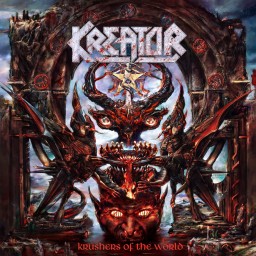
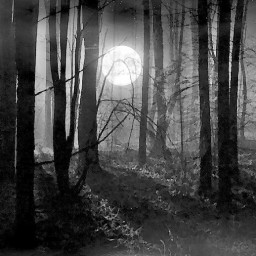 Sonny
Sonny
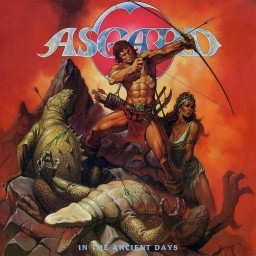
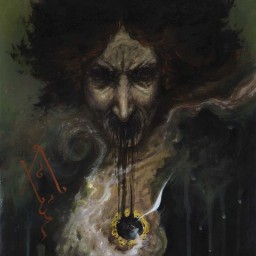 Vinny
Vinny
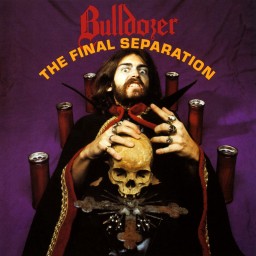
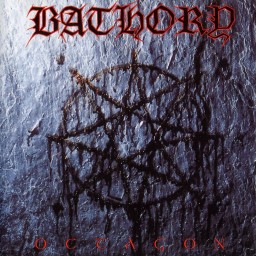
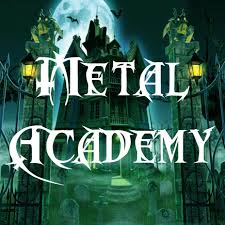 Daniel
Daniel
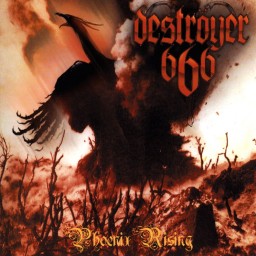
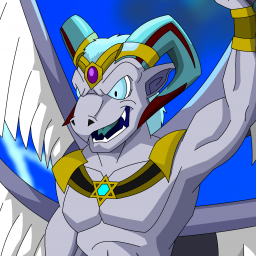 Rexorcist
Rexorcist
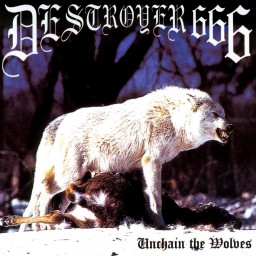
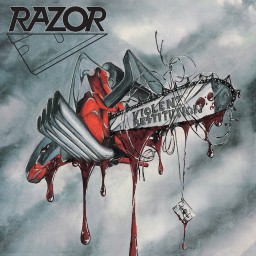
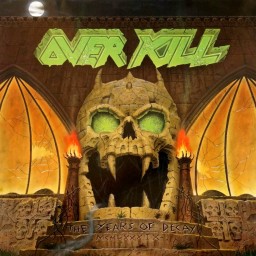
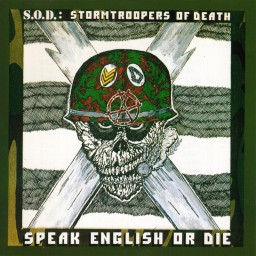
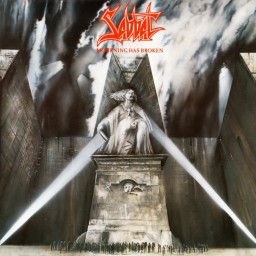
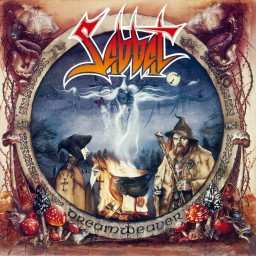
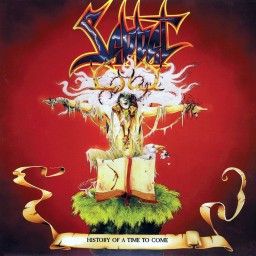
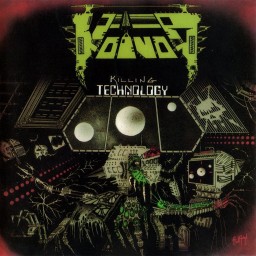
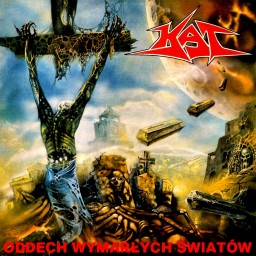
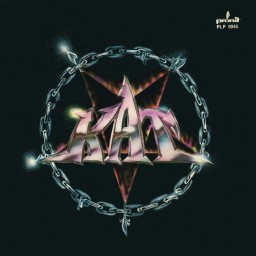
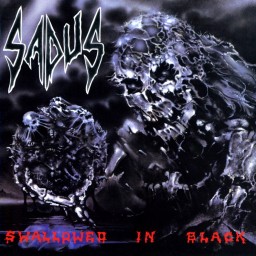
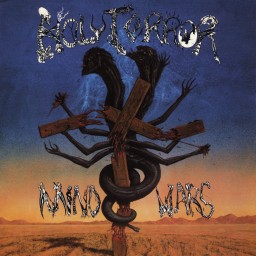
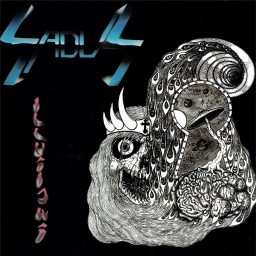
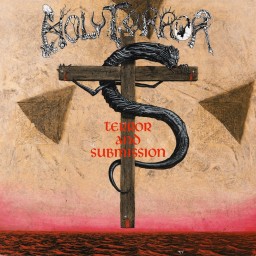
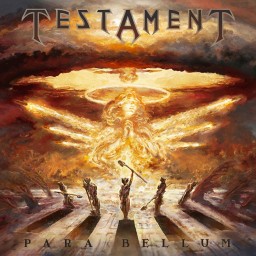
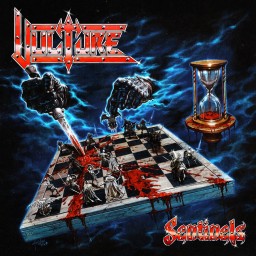
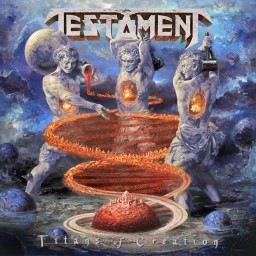
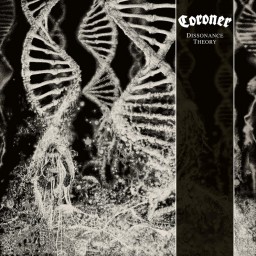
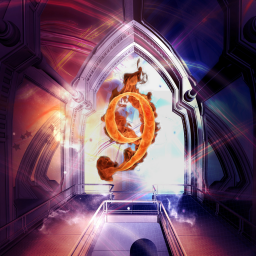 Shadowdoom9 (Andi)
Shadowdoom9 (Andi)
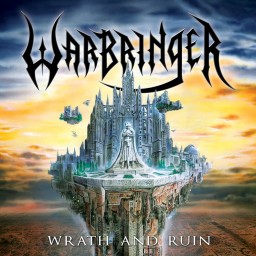
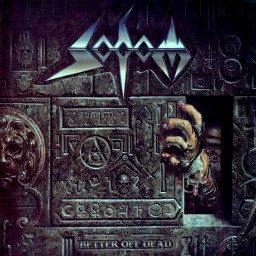
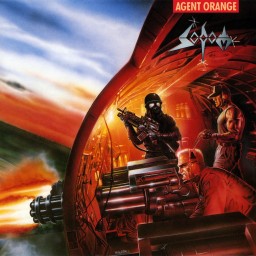
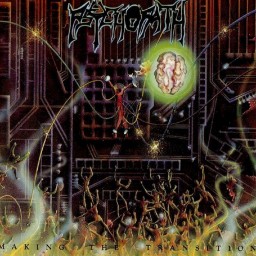
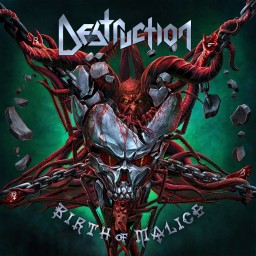
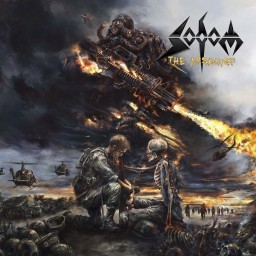
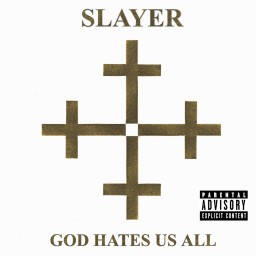
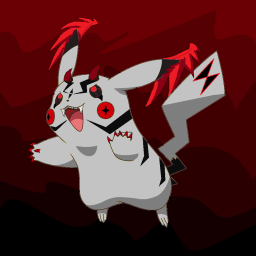 SilentScream213
SilentScream213
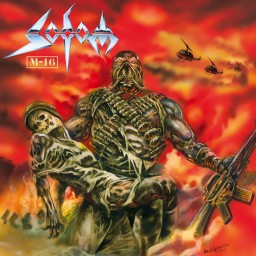
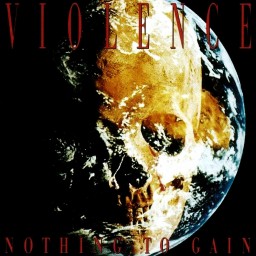
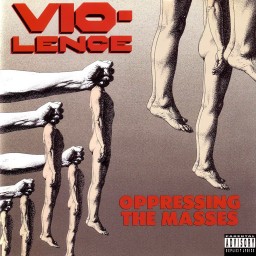
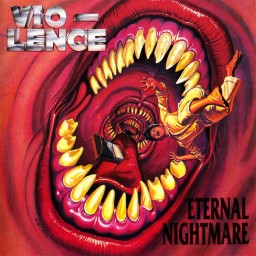
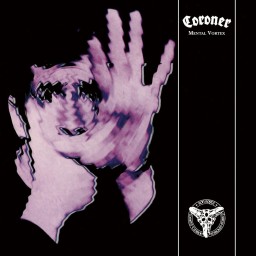
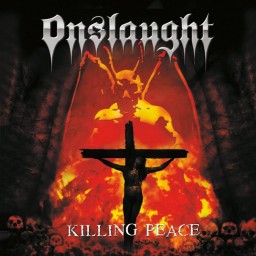
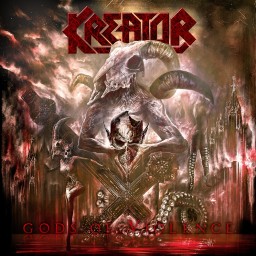
 Saxy S
Saxy S
